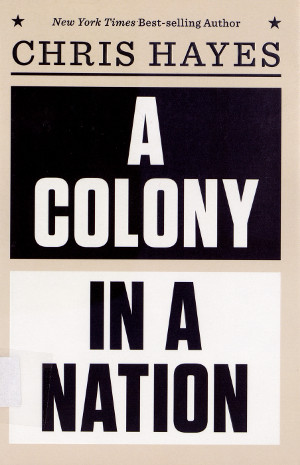Número de ficha: 138546
Me gusta
0
No me gusta
0
Para calificar el registro, es necesario acceder al sistema.
Ir a la página de acceso
- ISBN
- 978-0-393-25422-8
- Clasificación DEWEY
- 364.3496073 HAY-a
- Autor
- Hayes, Christopher L. , autor
- Título
- A colony in a nation / Chris Hayes
- Edición
- Primera edición .
- Lugar de publicación
- New York, NY W. W. Norton & Company 2017
- Descripción
- 256 páginas ; 24 cm.
- Tipo de medio digital o análogo
- sin medio rdamedia
- Medio de almacenamiento
- volumen rdacarrier
- Bibliografía
- Incluye referencias bibliográficas e índice.
- Nota de Resumen
- America likes to tell itself that it inhabits a postracial world, yet nearly every empirical measure -- wealth, unemployment, incarceration, school segregation -- reveals that racial inequality has barely improved since 1968, when Richard Nixon became our first "law and order" president. MSNBC anchor Chris Hayes upends our national conversation on policing and democracy in a book of wide-ranging historical, social, and political analysis. Hayes contends our country has fractured in two: the Colony and the Nation. In the Nation, we venerate the law. In the Colony, we obsess over order, fear trumps civil rights, and aggressive policing resembles occupation. How and why did Americans build a system where conditions in Ferguson and West Baltimore mirror those that sparked the American Revolution? A Colony in a Nation examines the surge in crime that began in the 1960s and peaked in the 1990s, and the unprecedented decline that followed. Drawing on close-hand reporting at flashpoints of racial conflict, as well as deeply personal experiences with policing, Hayes explores cultural touchstones, from the influential "broken windows" theory to the "squeegee men" of late-1980s Manhattan, to show how fear causes us to make dangerous and unfortunate choices, both in our society and at the personal level. With great empathy, he seeks to understand the challenges of policing communities haunted by the omnipresent threat of guns. Most important, he shows that a more democratic and sympathetic justice system already exists -- in a place we least suspect.
- Fuente de adquisición
- compra ; sandi ; 30-06-2017
- Materia
- Afroamericanos -- Administración de Justicia Penal
- Administración de Justicia Penal -- Estados Unidos
- Justicia Social -- Estados Unidos
| etiq. | info |
|---|---|
| 000 | 01252cam a22003378i 4500 |
| 001 | 19592976 |
| 005 | 20170412091220.0 |
| 006 | a |
| 008 | 170703s2017 nyu rb 001 0 eng d |
| 020 | |a978-0-393-25422-8 |
| 035 | |a138546 |
| 040 | |aDLC|bspa|erda|cDLC|dCOLMICH |
| 082 | 00|a364.3496073|bHAY-a |
| 100 | 1 |aHayes, Christopher L.|eautor |
| 245 | 12|aA colony in a nation |cChris Hayes |
| 250 | |aPrimera edición |
| 264 | |aNew York, NY |bW. W. Norton & Company|c2017 |
| 300 | |a256 páginas|c24 cm. |
| 336 | |atexto|2rdacontent |
| 337 | |asin medio|2rdamedia |
| 338 | |avolumen|2rdacarrier |
| 504 | |aIncluye referencias bibliográficas e índice. |
| 520 | |aAmerica likes to tell itself that it inhabits a postracial world, yet nearly every empirical measure -- wealth, unemployment, incarceration, school segregation -- reveals that racial inequality has barely improved since 1968, when Richard Nixon became our first "law and order" president. MSNBC anchor Chris Hayes upends our national conversation on policing and democracy in a book of wide-ranging historical, social, and political analysis. Hayes contends our country has fractured in two: the Colony and the Nation. In the Nation, we venerate the law. In the Colony, we obsess over order, fear trumps civil rights, and aggressive policing resembles occupation. How and why did Americans build a system where conditions in Ferguson and West Baltimore mirror those that sparked the American Revolution? A Colony in a Nation examines the surge in crime that began in the 1960s and peaked in the 1990s, and the unprecedented decline that followed. Drawing on close-hand reporting at flashpoints of racial conflict, as well as deeply personal experiences with policing, Hayes explores cultural touchstones, from the influential "broken windows" theory to the "squeegee men" of late-1980s Manhattan, to show how fear causes us to make dangerous and unfortunate choices, both in our society and at the personal level. With great empathy, he seeks to understand the challenges of policing communities haunted by the omnipresent threat of guns. Most important, he shows that a more democratic and sympathetic justice system already exists -- in a place we least suspect. |
| 541 | |acompra|csandi|d30-06-2017 |
| 598 | |aJULIO2017 |
| 598 | |aBiblioteca |
| 650 | 0|aAfroamericanos|xAdministración de Justicia Penal |
| 650 | 0|aAdministración de Justicia Penal |zEstados Unidos |
| 650 | 4|aJusticia Social|zEstados Unidos |
| 906 | |a7|bcbc|corignew|d1|eecip|f20|gy-gencatlg |
| 925 | |aacquire|b1 shelf copy|xpolicy default |
| 955 | |brm13 2017-04-11|crm13 2017-04-11|dxm06 2017-04-12|wxm06 2017-04-12 |
| 963 | |aClaire Reinertsen; phone: 212-790-4333; fax: 212-869-0856; email: creinertsen@wwnorton.com; bc: creinertsen@wwnorton.com |
